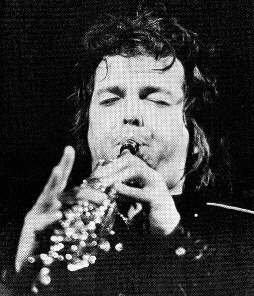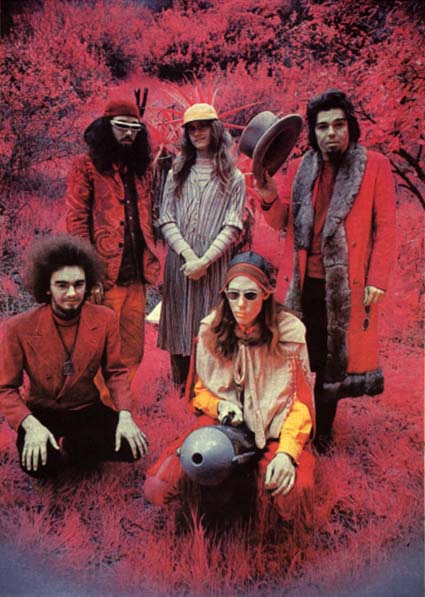

Captain Beefheart was born Don Van Vliet in Glendale, California, in
1941. A creative child, he spent most of his time sculpting in his room
while his parents pushed food under the door. He recorded for the first
time in 1959, after
being encouraged to sing by one of his schoolfriends, Frank Zappa.
Sporadic collaboration with Zappa lasted until 1964, when Beefheart formed
the first Magic Band in Lancaster, while Zappa moved to Los Angeles to
form The Mothers Of Invention.
Beefheart and his band - featuring Alex St Clair and Doug Moon on guitars, Jerry Handley on bass and Paul Blakely on drums - attracted enormous local interest, largely due to their outrageous stage appearance: long hair, high-heeled boots and leather jackets. A single, "Diddy Wah Diddy", a Bo Diddley song, was released on A&M Records and was a local hit, but the next single, "Moonchild", was unsuccessful. When Beefheart delivered the tapes of an LP, Safe As Milk, to the co-head of A&M, Jerry Moss, it was declared to be 'too negative' and the company refused to release it. Disillusioned, the band split up.
In 1966, Beefheart was persuaded to re-form the Magic Band and re-record Safe As Milk for Buddah Records. A new guitarist, Ry Cooder, was brought in to help with arrangements and John French joined on drums. The LP fused elements of delta blues, R&B, jazz and soul, and used rather unusual instrumentation - such as the theremin, a then-novel electronic instrument that responds to movement (Brian Wilson also used it, for the distinctive opening to "God Only Knows"). Following the album's release, Beefheart became the greatest underground find of the decade so far, and was proclaimed the 'the greatest white blues singer'. Yet while his voice was similar to that of Howlin' Wolf, his lyrics certainly weren't: verbs became nouns, adjectives became verbs, ants became the size of elephants, sounds became smells, sights became tastes.
Ry Cooder left the band before the recording of the next LP to pursue a successful solo career and was replaced by Jeff Cotton. Strictly Personal (1968) saw a movement towards longer songs and a more intense form of blues. (Indeed, the four-track Mirror Man LP, recorded at the same time but not released until 1971, features some songs over ten minutes in length.) However, after the triumph of the previous record, Strictly Personal damaged Beefheart's reputation quite badly. The mixing of the record was done without his approval; it was littered with phasing and other 'spacey' effects by producer Bob Krasnow, and Beefheart was left with a psychedelic, acid-rock record that was certainly not what he intended. He disowned the record and, again, disillusionment set in. (Luckily most of it was re-issued in 1992 in its 'un-psychedelic' state, on the CD I May Be Hungry But I Sure Ain't Weird.)
His career resumed when he signed to Zappa's newly formed Straight label
in 1968. The band was given freedom to come up with whatever they wanted
and Beefheart used the opportunity to its full potential. While keeping
Jeff Cotton
(renamed 'Antennae Jimmy Semens') and French (renamed 'Drumbo'), he
recruited two new amateur musicians, Bill Harkleroad ('Zoot Horn Rollo')
and Mark Boston ('Rockette Morton'), who all began an intensive year of
rehearsal
that culminated in Trout Mask Replica (1969).
This record was Beefheart's greatest moment, his most bewildering and
fascinating record, at odds with all thedevelopments of his previous LPs.
It was a double LP in line with the fashions of the time, but it contained
no less than twenty-eight songs, an amazing concentration of thought. Beefheart
used the standard rock unit of two guitars, bass guitar and drums, but
the bass and drums worked against each other, while the guitars no longer
opted for rhythm or lead parts - indeed, they often gave the impression
that they weren't playing in the same room. Lester Bangs, writing in
Rolling Stone, was stunned by the result: 'Trout Mask Replica shattered
my skull, made me nervous, made me laugh...it was a whole new universe,
a completely realised and previously unimaginable landscape of guitars...it
hit like
a bomb.'
After Trout Mask Replica, John French was replaced by Art Tripp III
('Ed Marimba', on marimba and percussion), who appeared on the wonderful
fifth LP, Lick My Decals Off, Baby (1970). It was a much darker record
than the previous one, addressing issues such as pollution and destruction
of the planet. A Beefheart-directed promo video was immediately banned
by a local TV station, and has since achieved legendary status, with many
fans baffled as to why anyone should have banned footage of coins being
flicked at a wall, a man in a mask using an egg
whisk, and the Captain pushing over a tub of paint.
Claiming an interest in more commercial success, Beefheart moved on to the glum but sporadically inspired The Spotlight Kid (1972), the bright, effervescent though occasionally sickly Clear Spot (1972), and the nasty and thoroughly sickly Unconditionally Guaranteed (1974). The drift towards American MOR rock was completedwith Bluejeans And Moonbeams (1974), which showed none of the old Magic Band traits whatsoever. In fact the LP was recorded with session musicians to fulfil a contractual obligation for Mercury Records after the old disillusioned line-up had quit. Suitably perverse, Beefheart dismissed his last two LPs as 'horrible and vulgar' andurged the fans to go back to the shops for a refund.
Zappa gave Beefheart a job in The Mothers Of Invention for the Bongo Fury (1975) LP and tour, and set about producing for his next LP, Bat Chain Puller (1978), with an entirely new Magic Band, featuring Jeff Moris Tepper and Richard Redus on guitars, Eric Drew Feldman on keyboards, and Robert Williams on drums. However, owing to a split between Zappa and his manager, the LP was halted by an injunction. Instead, it had to be re-recorded with a revised track listing and eventually appeared as Shiny Beast in 1980. Fans breathed a sigh of relief as the Captain returned to form, alternating between styles in the same way he had on Safe As Milk - from the poppy Latin sound of "Tropical Hot Dog Night", to the spoken word "Apes-Ma" and the more impenetrable "Bat Chain Puller" itself (said to be based on the rhythm of Beefheart's car windscreen wipers!).
This LP was closely followed by Doc At The Radar Station (1980), for
which John French re-joined on guitar and occasional drums, and the final
LP, Ice Cream For Crow was released in 1982 (with Cliff Martinez on drums
and Richard "Midnight Hatsize" Sneyder on bass), at which point Beefheart
retired to the Mojave Desert
to continue his already lucrative painting career.
These last two LPs showed a marked return to the Trout Mask Replica
style, and, in fact, most of the material on these last LPs was first worked
on at that time, and few were new compositions. As John French said, in
reference to the 1969/70 period: 'He had a huge amount of creative energy,
he was just a powerhouse. He did a lot of his creating during that time...he
was using that stuff for years, even on his last
album'.
Captain Beefheart has remained a much-maligned character, often dismissed
as creating weirdness for the sake of weirdness. Colin David Webb's book,
Captain Beefheart: The Man And His Music, begins with the words, 'Genius,
charlatan, freakshow or egomaniac?'. It seems possible that Beefheart
is all four, and there is no doubt that he is a very unusual man. Even
influential British DJ John Peel, although reluctant to be seen as contributing
to the mythology
surrounding Beefheart, recounted a story of his almost alien behaviour:
'If someone was going to phone him, he would know that they were going
to phone, and he would go and wait by it for a few seconds until it rung!
I know it makes me seem like some sort of hippy derelict, but he was quite
simply the most extraordinary man I've ever met...If anyone in the world
of rock music really deserved to be labelled as a "genius", I think that
he could be it.'
